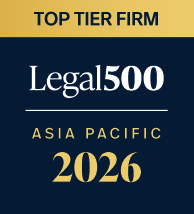'Legal 500 Asia Pacific 2026' ranks Lee & Ko in the top tier in 16 practice areas

Lee & Ko was selected as Tier 1 law firm in Korea across 16 fields according to ‘The Legal 500 Asia Pacific 2026’. Furthermore, 44 Lee & Ko attorneys were selected as ‘Hall of Fame’, ‘Leading Partners’, ‘Next Generation Partners’, and ‘Leading Associates’ in their respective fields.


Antitrust and Competition

Banking & Finance

Capital Markets

Corporate and M&A

Dispute Resolution

Fintech and financial services regulatory

Insurance

Intellectual Property

International Arbitration

Labour and Employment

Projects and Energy

Real Estate

Regulatory: white-collar, compliance and investigations

Shipping

Tax

TMT


Antitrust and Competition: Hwan Jeong, Suruyn Kim, Jung Won Kwon, Jeong Yoon Choi

Banking & Finance: Yeo Kyoon Yoon, Myoung Chul Kwak

Capital Markets: Hyunjoo Oh

Corporate and M&A: Hyeong Gun Lee, Sang Gon Kim, Ho Joon Moon, Kyungchun Kim, Sung Min Kim, Daehoon Koo

Dispute Resolution: Pyoung Keun Song, Seong Won Chang, Jae Heon Park, Yeon Woo Lee

Fintech and financial services regulatory: Seong Hwan Ju

Insurance: Jin-Young Jung, Jin Hong Kwon, Sae Um Kim

Intellectual Property: Un Ho Kim, Keum Nang Park

Intellectual Property: PATMA: Kyungjin Kim, Soo Yeon Park

International Arbitration: Sanghoon Han, Saemee Kim, Han-Earl Woo

Labour and Employment: Chang-Soo Jin, Sang-Hoon Lee, Jae Hoon-Choi, William Kim, Shawn (Seong Ho) Han

Projects and Energy: Hun Ko

Real Estate: Jin Wook Yang, Jee In Kim

Regulatory: white-collar, compliance and investigations:: Tae Yop Lee

Shipping: Jin-Young Jung, Yun Jeong Seo, Yang Ho Yoon, Young Jae Park

TMT: Hwan Kyoung Ko, Kwang Bae Park, Il Shin Lee
The Legal 500 Asia Pacific is annually published by Legalease, a global agency that evaluates the capacity of law firms all over the world based on various standards through a comprehensive review of submitted documents by law firms, interviews with lawyers specialized in each field, and feedback from over 300,000 clients.